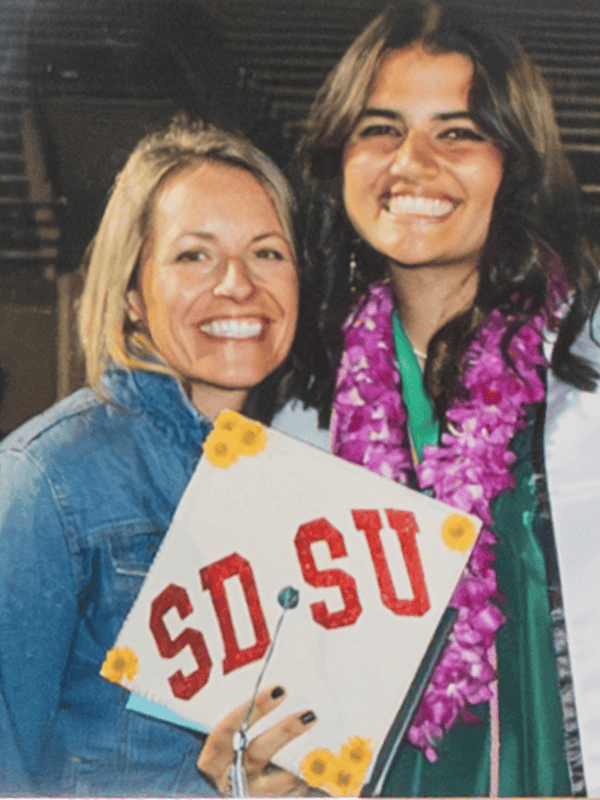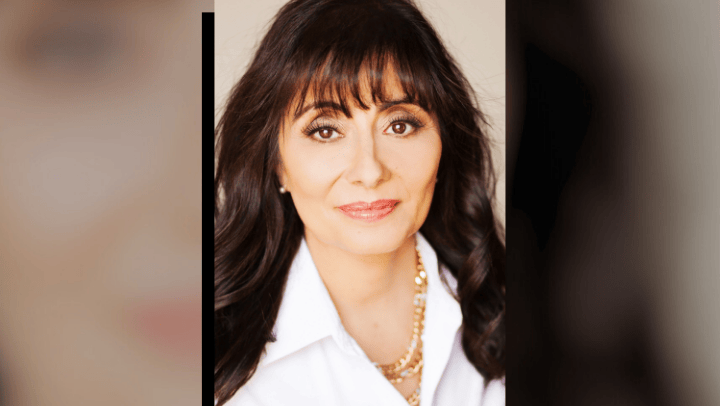SDSU grad says Women’s and Pride centers helped her turn grief into growth
After the sudden loss of her mother, SDSU senior Ila Pecus found strength, purpose and healing through mentorship and community — graduating in just three years with highest honors.

Community means everything to Ila Pecus.
Whether it’s her family and friends in Coronado or the family she has created within the walls of the Pride and Women’s Resource centers on Lindo Paseo, Pecus said these communities have been her anchors during her time at San Diego State University — a period that hasn’t always been smooth sailing.
Pecus is set to graduate summa cum laude this month with a bachelor’s degree in liberal studies with an emphasis in elementary education, a feat she accomplished in three years — and 20 months after her world was upended by the death of her mother, Lisa.
“Were it not for the community at the WRC and Pride Center, I don’t think I would have been able to achieve the same academic success,” Pecus said. “The community was something I really needed at the time.”
“The time” was Sept. 26, 2023, one month into the start of the fall semester of her second year. Pecus, who was finishing up a session mentoring a fellow student at the Pride House when her younger sister called to say her mother had collapsed at their Coronado home.
Her uncle picked up her and her cousin, who was a first-year student at SDSU at the time, and they drove back to Coronado where Pecus received the news her mother had died.
Pecus said she assumed her life was about to be placed on hold.
“I first thought that I would be taking the semester off to figure things out,” Pecus said. “And I think if I didn’t live locally and have my family here that probably would have been the case.”
Pecus, however, said she wanted to continue her studies, and her family — especially her father, Ed, who she called “one of the strongest people I know” — and friends all rallied around her to provide her support. She returned to campus two weeks later.
 Open the image full screen.
Open the image full screen.
“My dad, my extended family, my friends, my roommates, they were all great,” Pecus said. “I leaned on them a lot.”
The Pride Center and WRC provided her with something she desperately needed: normalcy.
“They were great at letting me be in the space without necessarily being fully present mentally while I was adjusting to being back in school,” she said. “I don’t think my return would have been as successful without that.”
For Pecus, the centers, housed in a pair of cottages on the southeast corner of Lindo Paseo and Campanile Drive, have provided a community since her first day on campus in fall 2022. SDSU encourages students to find their community or communities — whether based on academic or outside interests, identity or friends from housing — because its research shows students who report feeling at home at SDSU are more likely to graduate and to do so in a timely manner.
Pecus lived on the Women and Gender Equity floor in South Campus Plaza South and was enrolled in the namesake course during her first year. The highlight, she said, was the peer mentor she was assigned as part of the course, which inspired her to become a mentor the next two years.
“The centers have meant so much to me the past three years; the mentor program has been so fulfilling and amazing,” she said. “I kind of didn’t love my freshman year, but I had a mentor, and that was definitely the highlight for me. I loved her, and that hour we’d get to spend together every other week. She was just an unbiased point of view and a listening ear, and it was great to have that consistency during my freshman year.”
Flash forward to her return to campus after her mother died in 2023, and Pecus said just the ability to come to work at the Pride Center, be a listening ear to her mentees, and the fellowship with the staff was healing in itself.
“It was such a highlight for me,” Pecus said of mentoring. “It was nice to have that last year, being able to talk about someone else’s highs and lows, and to watch the growth throughout the year.
“And the mentors, we formed a great bond; it was such a great group of people both at the WRC and the Pride Center,” she said.
Pecus, who currently serves as a WAGE floor mentor, forged a special relationship with her supervisor in the mentor program, Amanda Beardsley, who is also a lecturer in women’s, gender, and sexuality studies.
“She has been my No. 1,” Pecus said. “She is so fierce and was so easy to talk to when I needed her.”
Their bond deepened after Beardsley lost her mother last summer.
Beardsley called it a privilege to work alongside Pecus over the past three years.
“She is an incredibly talented student who has taught me not only about creativity, dedication and mentorship, but also about the power of connecting with others on a human level, as she modeled grace, vulnerability and camaraderie in our shared grief,” Beardsley said. “I'm beyond proud of the work she has done and the lives she has inevitably touched — including mine — in her undergrad.”
Pecus, who will stay at SDSU to get her multi-subject teaching credential starting this fall, said she thinks about her mother, who she described as “everyone’s rock,” and the lessons she imparted to her constantly, and knows her mom would be proud of her for forging forward with school.
“She would always say ‘You can do hard things,’” Pecus said. “It used to make me so mad. But it has stuck with me. Especially now.”
If anything, Pecus said, she hopes her example imparts the importance of finding community when you arrive on campus.
“It’s a whole lot easier to get through classes when you have a community outside of class,” Pecus said. “I feel much more motivated to do my work when I know I have other things to look forward to, whether that’s going to work or having these people I know I can talk to or text because we’re in the same space and have the same mindset.
“Finding community is the most important thing when you get to college. It might be a fraternity or a sorority, or finding the WRC and hanging out there multiple times a week, and going to the programming, or whatever it might be.
“Community, I think, is what makes or breaks your college experience,” Pecus said.




